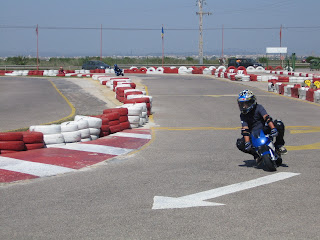Will
We form the will-future with the auxiliary will and the infinitive of the verb.
Ex:
(Affirmative)
He will play football.
He'll play football.
(Negative)
He will not play football.
He won't play football.
He'll not play football.
(Questions)
Will he play football?
We use will when future actions happen without the speaker's intention (birthday, weather, etc.), for predictions, assumptions (I think, I hope, I'm sure, I'm afraid) and for Ssontaneous actions (not planned).
Ex:
The sun will shine tomorrow.
Peter will be 15 next Tuesday.
I think Sue will arrive in Paris at 6 pm.
Hang on! I'll have a word with you.
Credits: Will
Thursday, July 31, 2008
Monday, July 21, 2008
Going To!
Going to is formed with: to be (am, are, is) + going to + infinitive.
Ex:
I am going to play handball.
I am not going to play handball.
Am I going to play handball?
We use going to when is a planned action in the future and when you are certain that something is going to happen in the future.
Ex:
We are going to sing at the party.
They are going to fly to South Africa.
Look at this car! It is going to crash into the yellow one.
Credits: Going to
Going to is formed with: to be (am, are, is) + going to + infinitive.
Ex:
I am going to play handball.
I am not going to play handball.
Am I going to play handball?
We use going to when is a planned action in the future and when you are certain that something is going to happen in the future.
Ex:
We are going to sing at the party.
They are going to fly to South Africa.
Look at this car! It is going to crash into the yellow one.
Credits: Going to
Thursday, July 10, 2008
Present simple!
Present simple is formed with: [VERB] + s/es in third person.
Ex:
You speak English.
Do you speak English?
You do not speak English.
He speaks English.
Does he speak English?
He does not speak English.
We use the Simple Present to express the idea that an action is repeated or usual(a rutine). The action can be a habit, a hobby, a daily event, a scheduled event or something that often happens. It can also be something a person often forgets or usually does not do.
Ex:
I play tennis.
She does not play tennis.
Does he play tennis?
The train leaves every morning at 8 AM.
The train does not leave at 9 AM.
When does the train usually leave?
She always forgets her purse.
He never forgets his wallet.
Every twelve months, the Earth circles the Sun.
Does the Sun circle the Earth?
Credits: english
Present simple is formed with: [VERB] + s/es in third person.
Ex:
You speak English.
Do you speak English?
You do not speak English.
He speaks English.
Does he speak English?
He does not speak English.
We use the Simple Present to express the idea that an action is repeated or usual(a rutine). The action can be a habit, a hobby, a daily event, a scheduled event or something that often happens. It can also be something a person often forgets or usually does not do.
Ex:
I play tennis.
She does not play tennis.
Does he play tennis?
The train leaves every morning at 8 AM.
The train does not leave at 9 AM.
When does the train usually leave?
She always forgets her purse.
He never forgets his wallet.
Every twelve months, the Earth circles the Sun.
Does the Sun circle the Earth?
Credits: english
Tuesday, July 08, 2008
Present continuous!
Present continuous is formed with: am/is/are + present participle.
Ex:
He is doing homework.
Is he doing homework?
He is not doing homework.
We use present continuous when somehting is doing at the moment and to say what is not doing at the moment.
Ex:
You are learning English now.
You are not swimming now.
Are you sleeping?
I am sitting.
I am not standing.
Is he sitting or standing?
They are reading their books.
They are not watching television.
What are you doing?
Why aren't you doing your homework?
Credits: Wikilearning
Present continuous is formed with: am/is/are + present participle.
Ex:
He is doing homework.
Is he doing homework?
He is not doing homework.
We use present continuous when somehting is doing at the moment and to say what is not doing at the moment.
Ex:
You are learning English now.
You are not swimming now.
Are you sleeping?
I am sitting.
I am not standing.
Is he sitting or standing?
They are reading their books.
They are not watching television.
What are you doing?
Why aren't you doing your homework?
Credits: Wikilearning
Subscribe to:
Comments (Atom)

